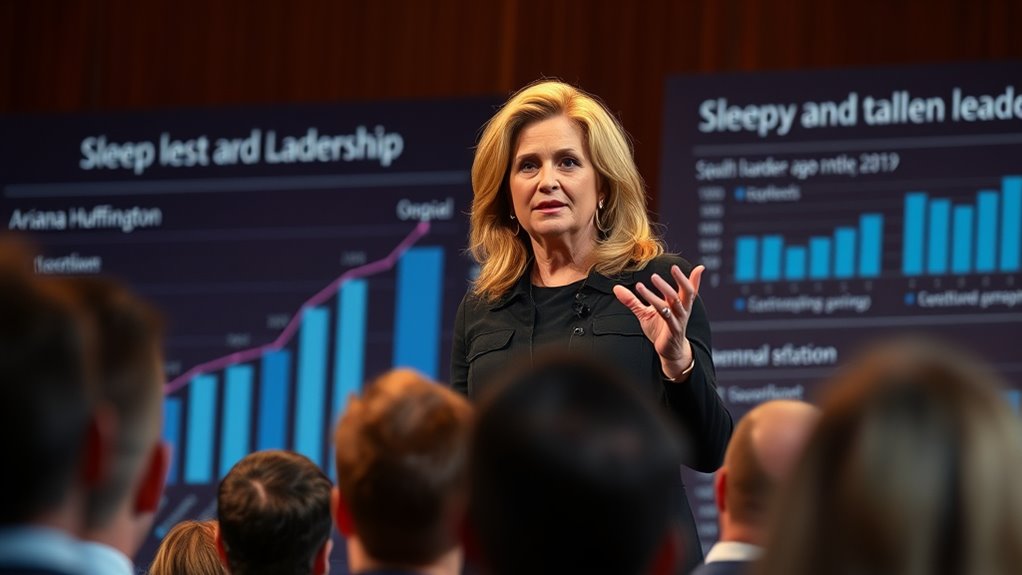In her leadership talks, Arianna Huffington emphasizes that sufficient sleep is essential for making clear decisions, managing emotions, and staying resilient under pressure. She explains how rest improves cognitive function, boosts creativity, and enhances emotional stability—key traits for effective leadership. Huffington also highlights that organizations benefit from promoting healthy sleep habits, fostering more engaged teams. If you want to discover practical tips and the science behind sleep’s role in leadership success, keep exploring this crucial topic.
Key Takeaways
- Arianna Huffington emphasizes that adequate sleep enhances emotional resilience and decision-making in leadership.
- She advocates for prioritizing rest to improve cognitive function, creativity, and problem-solving abilities.
- Huffington highlights the negative impact of sleep deprivation on judgment, impulse control, and social interactions.
- She promotes organizational culture shifts that recognize sleep as vital for performance and well-being.
- Huffington shares practical strategies for establishing healthy sleep routines to support effective leadership.
The Impact of Sleep on Cognitive Function and Decision-Making

Sleep plays a crucial role in maintaining your brain’s ability to function effectively, especially when it comes to decision-making and problem-solving. When you don’t get enough rest, your cognitive processes slow down, making it harder to analyze situations clearly. Sleep helps consolidate memories and process information, so you can recall facts and think creatively. Without adequate sleep, your attention drifts, and your judgment becomes impaired. Sleep also reduces mental fatigue, allowing you to approach challenges with a fresh perspective. Additionally, fostering a digital-friendly environment at home can support healthy sleep habits by reducing screen time before bed. Creating a consistent sleep schedule can further enhance the quality of your rest and cognitive function. Quality sleep also enhances emotional regulation and reduces the risk of mental health issues, further supporting optimal cognitive performance.
Scientific Evidence Linking Rest to Leadership Effectiveness

Research consistently shows that leaders who prioritize rest are more effective and resilient. Studies reveal that adequate sleep enhances decision-making, problem-solving, and strategic thinking—all vital for leadership success. Rested leaders demonstrate better emotional regulation, enabling them to handle stress and conflict calmly. Sleep also boosts creativity and innovation, helping leaders adapt to rapidly changing environments. Additionally, understanding how sleep quality affects cognitive functions can inform better leadership practices and organizational policies. Moreover, organizations that promote healthy sleep habits support employee well-being and foster a more productive work culture. Sleep deprivation impairs judgment, increases impulsivity, and hampers the ability to connect with others. Scientific evidence links consistent rest to higher productivity and improved team performance. Employers increasingly recognize that leaders who prioritize their sleep foster healthier, more engaged workplaces. Prioritizing rest isn’t just about personal health; it’s a proven strategy to elevate leadership capabilities and drive organizational success. Furthermore, integrating somatic therapy techniques can help leaders manage stress and improve overall sleep quality, leading to more effective leadership.
Arianna Huffington’s Insights on Sleep and Emotional Resilience

Arianna Huffington emphasizes that emotional resilience is deeply connected to how well you prioritize sleep. When you get enough restful sleep, your brain processes emotions more effectively, helping you stay calm under pressure. Sleep reduces stress hormones and boosts your ability to handle setbacks without becoming overwhelmed. Huffington highlights that sleep isn’t just about physical recovery—it’s essential for maintaining mental clarity and emotional stability. If you neglect sleep, you’re more prone to anxiety, impulsivity, and burnout. Prioritizing quality rest builds your capacity to bounce back from challenges and stay centered. She encourages leaders to see sleep as a crucial investment in their emotional health, ensuring they respond thoughtfully rather than react impulsively in high-stakes situations. Recognizing the warning signs of burnout and emotional exhaustion can help you address issues early and maintain your emotional resilience, which is also supported by proper sleep quality. Additionally, understanding the science of sleep can empower leaders to implement healthier routines that foster long-term well-being.
Practical Strategies for Incorporating Better Sleep Habits

Implementing better sleep habits requires deliberate changes to your daily routine and environment. Start by setting a consistent sleep schedule, going to bed and waking up at the same time each day. Create a calming pre-sleep routine, such as reading or meditating, to signal your body it’s time to unwind. Optimize your bedroom for sleep: keep it cool, dark, and quiet. Avoid screens an hour before bed, and limit caffeine and alcohol intake. Use the table below to help integrate these habits:
| Habit | Action | Benefits |
|---|---|---|
| Consistent schedule | Sleep and wake at same time | Regulates your internal clock |
| Pre-sleep routine | Read or meditate | Eases transition to sleep |
| Environment optimization | Dark, cool, quiet room | Improves sleep quality |
Additionally, incorporating sleep-promoting habits like regular exercise and managing stress can enhance overall sleep quality. Recognizing the importance of attention in maintaining these routines can lead to more consistent improvements in sleep.
Furthermore, understanding the digital environment and limiting screen time before bed can significantly support sleep hygiene.
The Cultural Shift Toward Recognizing Sleep as a Leadership Asset

As awareness grows about the essential role sleep plays in effective leadership, organizations are beginning to shift their cultural attitudes. More companies now see rest as crucial to performance, decision-making, and innovation. Leaders are championing flexible schedules and encouraging employees to prioritize sleep without stigma. This cultural shift recognizes that tiredness hampers productivity and creativity, and that well-rested teams are more resilient and engaged. Public figures and industry influencers are speaking out about the importance of sleep, further normalizing its role in leadership success. Embracing data-driven strategies around sleep can help organizations implement effective policies and measure their impact on overall performance. Additionally, understanding the emotional impact of music can be a powerful tool for leaders seeking to inspire and motivate their teams. Incorporating knowledge about Self Watering Plant Pots and their benefits can serve as a metaphor for nurturing team growth sustainably. Recognizing the long-term benefits of sleep can motivate organizations to prioritize employee well-being and foster a healthier work culture. As you embrace this mindset, you’ll find that valuing sleep not only improves your well-being but also enhances your ability to lead effectively, inspiring others to follow suit and fostering healthier, more sustainable work environments.
Frequently Asked Questions
How Does Sleep Influence Creativity in Leadership Roles?
Sleep plays a vital role in your creativity as a leader. When you get enough rest, your brain processes information better, enhances problem-solving skills, and fosters innovative thinking. Lack of sleep hampers your ability to think clearly and creatively, making it harder to generate new ideas. Prioritizing quality sleep boosts your mental clarity, emotional resilience, and originality, ultimately empowering you to lead more effectively and inspire your team with fresh perspectives.
What Are Common Myths About Sleep and Leadership?
Did you know that 35% of leaders believe they can function well on less than six hours of sleep? Many myths persist, like thinking leaders don’t need sleep or that sacrificing sleep boosts productivity. You might think burning the midnight oil shows dedication, but in reality, it hampers decision-making and creativity. Prioritizing rest isn’t a weakness; it’s essential for effective leadership and sustained success.
Can Sleep Improvements Lead to Long-Term Leadership Success?
Yes, improving your sleep can lead to long-term leadership success. When you prioritize quality rest, you boost your decision-making, emotional resilience, and creativity. This consistency helps you stay focused and energized, making you a more effective leader over time. Sleep isn’t just about avoiding fatigue; it’s a strategic tool that enhances your ability to inspire, innovate, and lead with clarity and confidence.
How Do Cultural Differences Affect Attitudes Toward Sleep in Leadership?
You might notice that cultural differences shape how leadership views sleep. In some cultures, leaders prioritize rest as part of well-being, fostering productivity and balance. In others, long work hours and minimal sleep are seen as signs of dedication. Understanding these attitudes helps you adapt your leadership style, respecting diverse perspectives. Embracing healthy sleep habits across cultures can improve your decision-making, resilience, and overall effectiveness as a leader.
What Role Does Technology Play in Sleep Quality for Leaders?
Technology influences your sleep quality by disrupting your ability to unwind, by overstimulating your mind, and by delaying your bedtime. It keeps you connected, but also keeps you alert, making it harder to fall asleep. You may find yourself scrolling, notifications buzzing, or blue light interfering with melatonin. To improve sleep, you should limit screen time before bed, create tech-free zones, and establish a calming routine that signals your body it’s time to rest.
Conclusion
Just as the moon governs the tides, your sleep shapes your leadership essentiality. Embrace the science that shows rest fuels your decision-making and resilience, turning you into a lighthouse amidst turbulent waters. By prioritizing sleep, you open a wellspring of clarity and emotional strength, guiding your team through storms and calm alike. Remember, true leadership shines brightest when you honor the quiet power of restorative rest—your secret compass on the journey to success.










